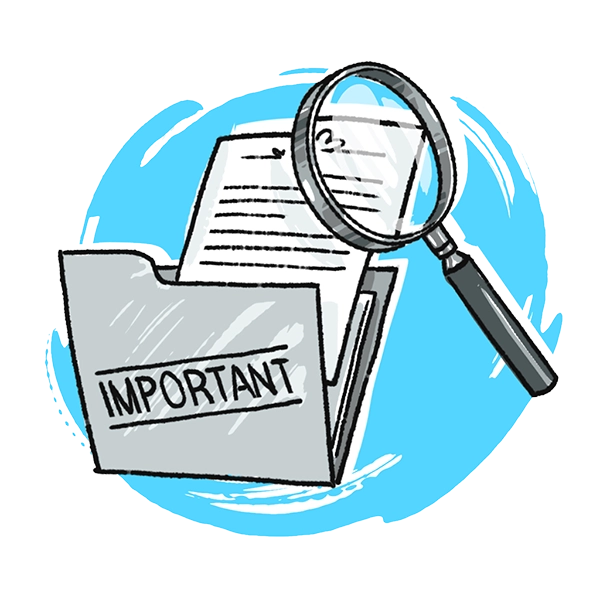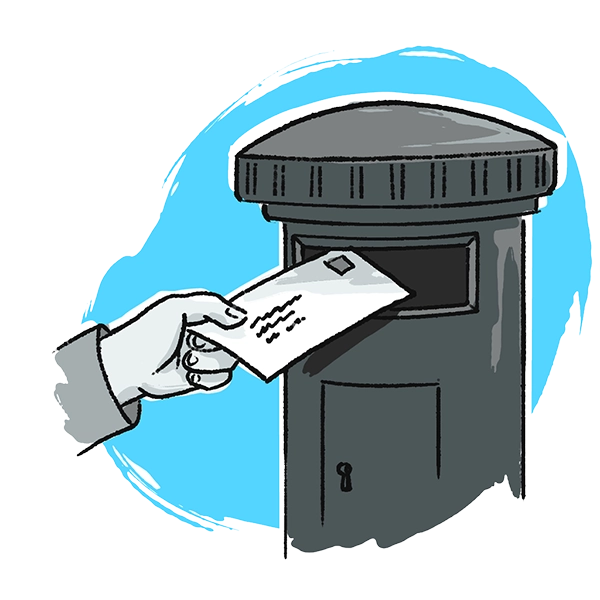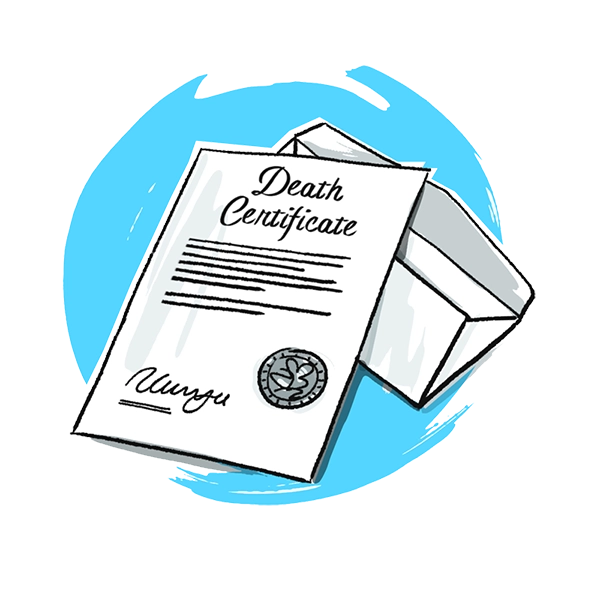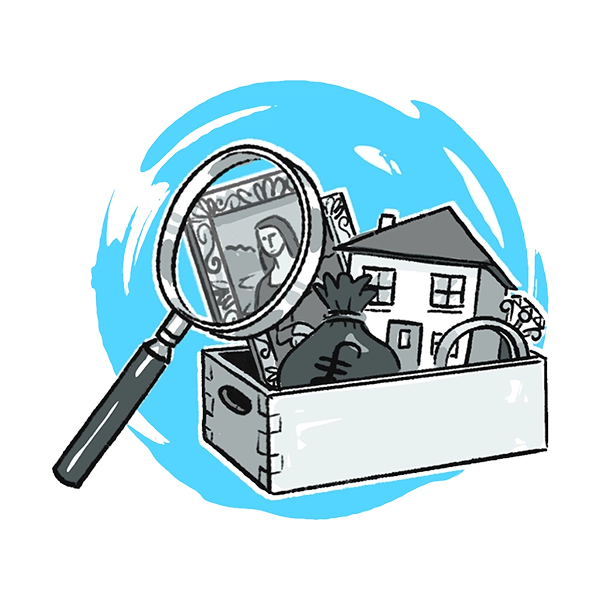Wills and Probate checklist
From registering a death to distributing an estate, this checklist will help guide you through managing the probate process. It provides a good starting point if you’re beginning this process and covers most of the steps you will need to take for managing probate in England and Wales.

1. After a death
Contact the doctor or hospital to report the death and obtain the medical certificate for the cause of death, providing the coroner is not involved.
Once a registered medical practitioner (usually a GP) has confirmed the death, they will also need to certify the death by issuing a medical certificate of the cause of death.
This certificate is required to formally register the death and is often given to you in a sealed envelope. Most doctors will explain what is written or show you the certificate in advance.

Contact the funeral director to start making arrangements for the funeral.
The funeral director will need to know some personal details about the deceased and whether they left a written record or told family or friends what arrangements they would prefer for their funeral.
If this is the case, arranging the funeral will be made simpler. If not, the funeral director will guide and support you in all aspects of arranging the funeral.

Locate the will.
If you don’t know where the deceased’s will is, then a search with professional bodies who may have written a will local to where they lived may be conducted to try and locate it – as it may contain specific directions concerning their funeral wishes.

Register the death.
The registration of death is the formal record of death and is usually the responsibility of a family member.
The registration process will depend on the nature and location of the death. All deaths need to be registered by the Registrar of Births, Marriages and Deaths in the district where the death takes place.
Deaths in England, Wales and Northern Ireland should normally be registered by the registrar within 5 days (8 days in Scotland). If a coroner is involved in the registration process, the registration can sometimes be delayed.

Obtain copies of the death certificate.
The registration of a death is a permanent record. This record is retained by the Registrar of Births, Marriages and Deaths.
A medical certificate is usually issued by a hospital doctor, who will hand the certificate to you in a sealed envelope addressed to the Registrar of Births, Deaths and Marriages.
You will also be given a notice explaining how to register the death and to obtain a certified death certificate.

Secure the deceased’s assets and property if it will be left unoccupied.
If the home of the deceased is left unoccupied, it is important to make sure that it is locked and that the deceased’s valuables are secure.
Post should be redirected to the address of one of the personal representatives. To do this, you can get a form from the Post Office.
If the deceased owned a car, the insurance company should be informed immediately, as the insurance policy will automatically become invalid.

The process of ‘confirmation’ in Scotland is different. For more information on what to do after the loss of a loved one in Scotland, visit scotland.gov.uk.
For those living in Northern Ireland, more information on the probate process can be found at www.nidirect.gov.uk/probate-and-wills
2. Regarding the will
Find and read the will, if there is one, and confirm its validity.
When a person dies, their money and belongings (or ‘estate’) are legally passed on to someone else.
If the deceased has written a will, then this needs to be consulted. The person(s) appointed in the deceased’s will to act as the executor(s) of the estate have the legal responsibility to carry out the wishes expressed in it.
Usually the will is stored with other vital documents in a secure location. This could be in a box file or a safe. In many cases a copy will also be kept with the solicitor who wrote it in liaison with, or on behalf of, the deceased.
If there is no will, and you have taken steps to prove this by way of a will search, the closest relatives of the deceased are expected to apply for the role of administrator.

Contact the personal representatives if they have been named in the will or, if there are no personal representatives, determine who is entitled to administer the estate.
When someone dies, the personal representative is responsible for administering the deceased person’s estate. More than one personal representative may administer the estate, but only one will receive the grant of representation.
If the personal representative is named in the will they are called the executor. If there is no will, or they are not named in the will, they are known as the administrator.
The executor(s) or administrator(s) of the will is responsible for:
- making endeavours to prove that a known will is the last will, or that no other will exists, by using a will search
- applying for a grant of probate
- placing a notice in The Gazette (as appropriate)
- establishing the total assets of the deceased
- paying the deceased’s debts
- paying any tax owed, such as Inheritance Tax
- distributing assets to beneficiaries, in accordance with the will

Find all documents relating to the deceased’s life, both financial and otherwise.
Collect personal documents belonging to the deceased and organise a list of the deceased’s assets and liabilities.
It is important to perform a thorough search of all the deceased’s papers in order to learn about their financial affairs. Make a list of their assets and investments as well as the debts they owed.
If the deceased was employed at the date of death, you should also write to the employer stating your position, and ask for a final assessment of outstanding wages. Be sure to enclose a copy of the death certificate.
If the deceased had accounts in place with service providers, these should be cancelled, provided they are in a sole name. Household bills such as water, gas, electricity and telephone will need to be settled or transferred to the spouse or civil partner’s new sole account.

Register the death with asset and liability holders.
When registering a death with asset and liability holders, you should ask them to confirm the value of each asset and liability at the date of death.
You should also ask them of the income levels received during the last tax year leading up to the date of death.

3. Regarding the estate
Open a bank account on behalf of the estate.
It is common practice to open a personal representative’s bank account on behalf of the estate. Money will then be paid into this account as funds of the estate are released.
By opening a personal representative’s account, you will be able to write cheques for the probate application forms and pay liabilities and debts where necessary.

Contact the personal application department of the Probate Registry and ask them to send you all the relevant forms.
The Probate Registry is part of the Family Division of HM Courts and Tribunals Service, and is responsible for the administration of grants of probate and grants of letters of administration.
You will need to apply to the registry in order to obtain a grant of probate or letters of administration.
The registry is also where your interview will take place, at which time you’ll swear an oath in order to obtain the grant.
You can find a list of addresses and contact details of all UK probate registries by visiting www.gov.uk/wills-probate-inheritance

Fill in the appropriate forms and send them back to the Probate Registry along with the original will and the deceased’s death certificate.
In many cases, the personal representative of the estate is able to apply for probate themselves.
You can apply for the forms online or by post. However, in the event of an intestate death (death without a will), complex estates, or where the deceased has assets abroad, you should seek legal assistance.

Depending on the complexity of the estate, you may wish to consult a professional. Most local solicitors offer services in carrying out investigations into estates, completing Inheritance Tax accounts and applying for probate.
4. Inheritance Tax
Complete form IHT400 if the estate is subject to Inheritance Tax, if it is worth more than £325,000 or if certain circumstances apply, such as foreign assets valued over £100,000.
You should fill out form IHT400 if the value of the estate is subject to Inheritance Tax.
You will need to send form IHT400 to the HM Revenue and Customs Inheritance Tax Office. If you are unable or unsure how to calculate the total amount of tax owed, HMRC will do it for you.
If the estate is liable for Inheritance Tax, you must also complete form IHT421 and send it together with PA1 (or C1) to the registry office. These should be sent along with the will and the death certificate. You can find these forms at www.gov.uk/government/collections/inheritance-tax-forms

Arrange funds to pay Inheritance Tax and the probate fees.
Inheritance Tax will need to be paid before the grant of representation has been received and therefore before it has been possible to draw in all the assets of the estate.
There are various ways to pay Inheritance Tax due on an estate, including paying on account or paying in instalments. For a complete list of payment methods, please see the GOV.UK guide which can be found at https://www.gov.uk/paying-inheritance-tax

The current Inheritance Tax threshold in the United Kingdom is £325,000. Forms IHT205 and IHT400 can be found at www.hmrc.gov.uk
5. Applying for probate
Attend the interview at the Probate Registry when requested to do so and swear the executor’s or administrator’s oath.
A few weeks after sending the probate application forms, you will be sent a letter confirming the date and time for an interview at the registry office. All personal representatives must attend this interview.
You should bring all of your paperwork to the interview in case you need to support your workings.
Once the appropriate forms are signed and the registry has all the information they need, you will be asked to sign the accounts and swear the executor’s or administrator’s oath, promising that the information you have given in the application form is true to your best knowledge and belief.

Receive the grant.
The grant of representation will be sent to you by post from the Probate Registry.
After you have received the grant of representation (or confirmation) and have paid any Inheritance Tax due, you can start to collect the money from the estate. You can then pay any debts owed by the estate and distribute the estate according to the will or the rules of intestacy.

When applying for probate you will need to attend an interview at the Probate Registry and swear an oath.
6. Placing a Deceased Estates notice in The Gazette
Place the statutory advertisement for creditors and claimants.
After you have received grant of representation, it is recommended that you put a statutory advertisement (under the Trustee Act 1925 for England, or the Trustee Act 1958 in Northern Ireland) in The Gazette and a local paper.
Should a Deceased Estates notice not be placed and a creditor subsequently comes forward after the estate has been distributed, then you may have some personal liability for an unidentified debt. The legislation appears at www.legislation.gov.uk/ukpga/Geo5/15-16/19/section/27 To place a Deceased Estates notice, visit www.thegazette.co.uk/place-a-deceased-estates-notice

Send a copy of the grant to all asset holders and request payment of all funds.
The grant gives you the authority to collect all of the estate’s assets. You should contact all relevant organisations and send them a copy of the grant.
The organisation should, upon receiving the grant, release the assets, so you can transfer them into the personal representative’s account that you have set up.

The purpose of publishing a Deceased Estates notice is to ensure that sufficient effort has been made to locate creditors prior to distributing the estate to beneficiaries, protecting the executor or trustee from being liable for any disclosed debts.
7. Finalising the estate
Pay all creditors.
After you have placed a notice in The Gazette, and claimed the estate’s assets, you should begin the process of paying off debts.
There is a set order of priority for who should be paid first:
- Funeral expenses, if not previously paid
- Any taxes
- Creditors, such as loans, mortgages, and outstanding debts
- If there is a will, and there are no creditors to make a claim against the estate, the beneficiaries can be paid
When paying off debts such as credit card loans or household bills, you should remember to ask for a full and final receipt of settlement. This receipt will be needed for your final accounts.
Once all debts and taxes have been paid, you can distribute the estate as detailed in the will or using the law, if there is no will.

Complete stock and share transfer forms and draft an assent for the property.
If the deceased owned stocks and shares, you should write to the registrar of the respective share company and ask them for confirmation that the certificates you have found are valid. You will be asked for a copy of the death certificate.
Receive an estimate of the share value or a formal valuation in the case of the estate being over the Inheritance Tax threshold. Complete the stock and share transfer forms as provided by the registrar of the respective company.

Once the accounts have been approved by the personal representatives, pay all beneficiaries and distribute all legacies.
After all assets have been claimed and after all debts and taxes have been paid, you should prepare the final estate accounts. These must be approved and signed, by both you and the main beneficiaries.
When the accounts have been agreed the remaining money in the personal representative’s bank account can now be distributed and the account can be closed.

